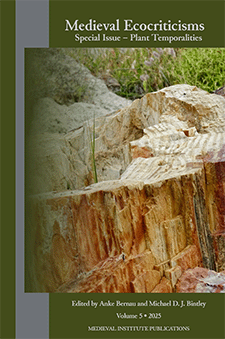In recent years, medieval studies has seen a flourishing of new ecocritical and environmental inquiries to literature, art, and culture. These new approaches, drawing upon the material, spatial, and post-human turns in humanities research, have directed scholarly attention to representations and histories of the non-human, and to the inarguable necessity of studying both human/human and human/non-human interactions in texts and cultures. Medieval Ecocriticisms is the first regular venue dedicated to medieval ecocritical studies, and seeks out the most current and innovative interdisciplinary approaches to the study of literature and the environment in the global Middle Ages.
This peer-reviewed journal is dedicated to publishing yearly journal issues, sometimes thematic, covering a wide and inclusive spectrum of approaches and methods in interdisciplinary ecocritical studies, including: ecofeminism and new ecocritical analyses of under-represented literatures; queer ecologies; posthumanism; waste studies; landscape studies; maritime studies and blue humanities; studies of environmental catastrophe and change and their effects on pre-modern cultures; as well as more traditional approaches that, nonetheless, are concerned with the ecological and environmental in some way. The board is open to submissions in literary and cultural studies, philosophy, environmental history, art history, environmental archaeology, zooarchaeology, and beyond.
Current Volume: Volume 5 (2025)
Complete Volume
Articles
Plant Temporalities: Living with Plants
Anke Bernau and Mike Bintley
Great Pieces of Turf
Kellie Robertson
Trees, Temporal Eternity, and the Norse Mythos
Timothy Bourns
Planting Sublimity
Patricia Dailey
Vegetal Improprieties: Plants and the Undoing of Seasons
Lara Farina and Chris Barrett
The Hart of the Wood: Antlers and Aldernate Temporalities in "Riddley Walker" and the Lives of St. Eustace
Danielle Cudmore, Sarah Harlan-Haughey, and Gabriella Fryer



